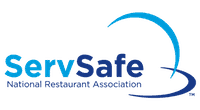The Path to a Food Safety Culture
Serving safe food and beverages to your customers on a consistent basis is critical to the long term success of your operation. Many operations that have been associated with a food borne illness outbreak do not survive and are quickly overcome by the bad press they receive, lost business and cost of litigation.
What are some key strategies to help ensure your operation does not succumb to a devastating incident?
Control of your processes and products is critical, including control of the food you serve, the people that handle, process and serve the products, the facilities where these products are processed, as well as where your guests may consume them.
The general categories of the root causes of foodborne illness outbreaks based on the data collected from the Centers for Disease Control and Prevention (CDC) are:
- Loss of controls with personal hygiene,
- Time and temperature of products,
- Cross-contamination, and
- Cleaning and sanitizing
So why do outbreaks of food-borne illnesses occur? Why do food safety systems fail?
There are many reasons but in many cases we can identify lack of proper training, human error or lack of adherence to established policies and procedures as root causes.
Let’s talk about why your employees would not follow established policies and procedures. First let’s assume (dangerous, I know) that training is not the issue. They know the hows and whys of your well-established production processes. Let’s assume again that the products you have received into your operation were not contaminated with anything that your processes could not make safe. Let’s eliminate the issue of not having the proper tools and equipment to safely process and serve the volume of products you have assigned them.
So what is the issue that needs to potentially be addressed?
A well-used formula from management states: P= M x A or Performance equals Motivation times Ability.
If your staff has the “Ability” then your focus needs to be on their “Motivation”. That is the where a food safety culture becomes critical to your operation. All the rules and procedures in the world will not make up for the lack of staff motivation when it comes to food safety.
Ask yourself the following questions:
- What message am I consistently sending to my staff about the importance of food safety? Do I “walk the talk?”
- Am I doing a good job of marketing food safety internally?
- Is my organization’s food safety expectations clearly articulated, understood and reasonable?
- Does my staff know that food safety is OUR number one priority?
- Does my staff believe that the safety of our guests is literally in their hands and that all of us are accountable?
- What incentives for positive behavior are in place for my staff as they relate to food safety? Do I reward excellent behavior and quickly correct improper behavior?
If an employee is trained and coached but still fails to follow established policies and practices, are they not allowed to handle or serve food and beverages? If they are allowed, your message to the rest of the staff is that food safety does not really matter here!
A food safety culture is key to your operation’s ability to consistently serve food and beverages that are safe to consume.
Developing and reinforcing a culture of food safety is a “team sport.” It takes work and dedication. Is it worth it? How much is peace of mind worth when you are away from your operation?
CLICK HERE to learn about our upcoming
Food Safety Training Program for Managers on 3/15, or
‘Sign Up Now’




